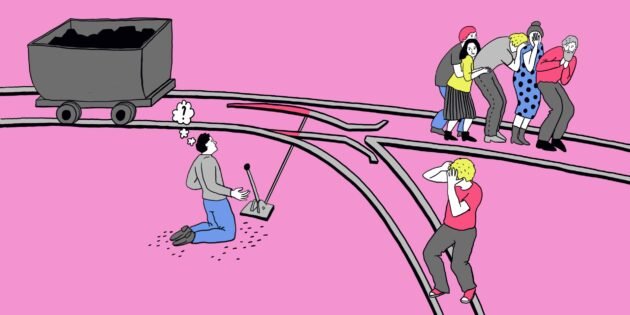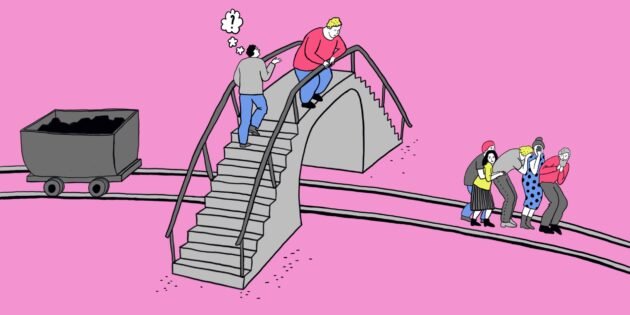More than two years ago, at the height of the pandemic, I came to the vaccination center in Moscow. It was scary: the nursing vaccines were only allowed, and my son was only 5 months old. But it was impossible not to go. As a doctor, I knew about newborns with total lung damage.
Of course, I understood that there are side effects of vaccination, but I thought (and still think) that they are not comparable with the risk of pneumonia at that age. When I came for an examination, the doctor tried to dissuade me, because no one had done this before and complications could arise. I got vaccinated anyway, everything went well, there were no side effects, and none of us got sick.
I think I know why she did that. Not because she is an anti-vaxer, a bad doctor or knows some terrible truth. She just saw me and decided not to risk one person even for the sake of observations that could help many in the future. It is natural for a doctor to choose a duty rather than a benefit to society, but this is not the only point of view.
Thus, the interests of individuals were sacrificed in the Soviet Union in the 1920s and 40s for the sake of a large-scale electrification project. Then, in a short time, a huge territory was connected to the power grid. Hydroelectric power plants were used as the main source of current. To launch them, reservoirs, dams and other structures were needed that disrupted the natural course of rivers.
As a result, Mologa, Kalyazin, Stavropol-on-Volga and many other settlements were flooded. Valentine Rasputin's novel "Farewell to Mater" is dedicated to these events.
At the heart of these stories is the trolley problem. This is a thought experiment that proposed in 1967 Next Stop: ‘Trolley Problem’ / Merriam Webster philosopher Philippa Foot. It is necessary to solve a fundamental ethical dilemma: is it possible to sacrifice one person for the benefit of the majority.
The subject is offered Trolley problem / Britannica imagine that he is standing at the switch of the arrows on the road on which the trolley is traveling. She is moving straight for five people, but you can pull the lever and send her to another path where there is one person.

From a mathematical point of view, everything is elementary — five lives are more valuable than one, but in reality it is not so simple. Even if these people are not familiar to you and you are a disinterested person.
When the task is transferred from the head at least to the simulation, it becomes to take responsibility K. B. Francis, S. Terbeck, R. A. Briazu, A. Haines, M. Gummerum, G. Ganis, I. S. Howard. Simulating Moral Actions: An Investigation of Personal Force in Virtual Moral Dilemmas / Scientific Reports is more complicated. Nevertheless, many choose to save five people, so the experiment becomes more complicated.
The subject needs to submit Trolley problem / Britannica that he is standing on an overpass and sees that a car or the same trolley is flying for five people below. He can push the fat man standing next to him (no fatphobia, just an experimental condition) to deflect the blow.
The second option: the subject is a judge and can give an innocent person to an angry crowd in order to avoid deaths in mass riots.
What do you choose?

As expected, not all the people who switched the lever in the example above were able to choose the majority in these situations. Because in one case it was necessary to indirectly cause the death of a person, and in these — to kill with their own hands. Make K. B. Francis, S. Terbeck, R. A. Briazu, A. Haines, M. Gummerum, G. Ganis, I. S. Howard. Simulating Moral Actions: An Investigation of Personal Force in Virtual Moral Dilemmas / Scientific Reports this was easier the more psychopathological and antisocial traits were expressed in the subject.
In the trolley problem, two philosophical approaches collide - utilitarianism and deontology.
Utilitarianism is a direction in ethics in which the moral value of an act is determined Utilitarianism / Britannica its usefulness. That is, the main task of morality is to increase happiness and reduce the amount of pain.
For example, a hackneyed trick: if you went back in time, could you kill Hitler while he was a baby? From the point of view of utilitarianism, this is the only possible option.
Utilitarians reject rigid morality and allow such concepts as, for example, a lie for salvation. At the same time, they understand that people cannot be impartial and, if it comes to them or their loved ones, they are likely to deviate from the principles. And yet the human mind cannot comprehend everything, and therefore predict all the consequences of the choice.
In deontological ethics, the emphasis is Deontological ethics / Britannica on the duty and morality of the act, in isolation from the result to which it will lead. This is the categorical imperative of Immanuel Kant, that is, the unconditional moral code of man. This means that everyone must follow rules that can never be violated: do not kill, do not steal, and so on.
So, Leonid Roshal provided medical assistance to terrorists in the captured theater on Dubrovka, because it is the duty of a doctor, otherwise it is impossible to do.
But such reinforced concrete principles can be harmful. For example, if the killer tries to find out the location of the victim from you, and you tell the truth, because you can't lie.
No. The experiment does not even show the level of human morality. It is worth at least in the conditions of the model to change one person to a close relative — and many will not hesitate to save him. But that doesn't make them bad people.
In real life, there are much more introductory and circumstances, so no one will ever be able to accurately assess whether the right choice was made.
Every day we decide which way to put the trolley. We can lie to a woman about cheating husband in order to save her family, or say, but destroy everything for several people. We can use medical triage and choose who we will help to reach as many people as possible, or we can fight for everyone, knowing that because of this we can have less time. We make these choices all the time, even if we don't realize it.
If you know that there is no right answer, then it will be easier to choose. You can live with the "starry sky above your head and the moral law inside you" and always do the right thing — or evaluate each situation individually to choose the best option for the majority. Whatever you do, at the moment it will be the only possible option for you.
At the same time, try to understand your neighbor. You will never know what was in his "trolley" and what choice he faced. What seems obvious to you could be a serious test for him because of a nuance that you don't know about. Try to accept that this person has chosen the only possible option for himself in a particular situation.